广州版7年级英语上册U2 语法一般现在时
七年级上册英语一般现在时态
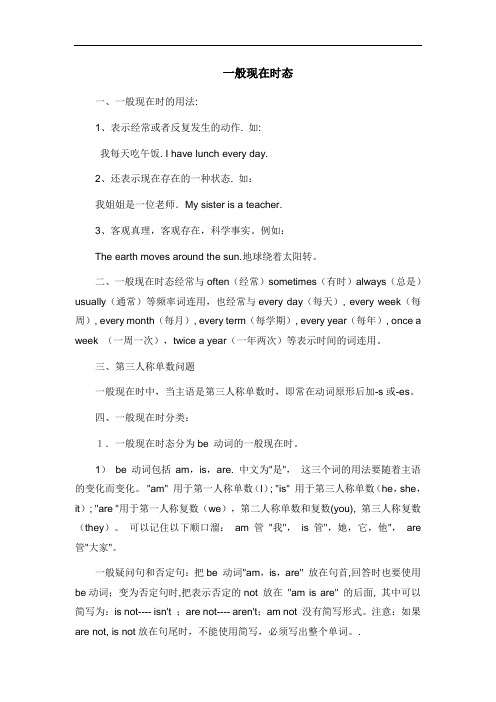
一般现在时态一、一般现在时的用法:1、表示经常或者反复发生的动作. 如:我每天吃午饭. I have lunch every day.2、还表示现在存在的一种状态. 如:我姐姐是一位老师.My sister is a teacher.3、客观真理,客观存在,科学事实。
例如:The earth moves around the sun.地球绕着太阳转。
二、一般现在时态经常与often(经常)sometimes(有时)always(总是)usually(通常)等频率词连用,也经常与every day(每天), every week(每周), every month(每月), every term(每学期), every year(每年), once a week (一周一次),twice a year(一年两次)等表示时间的词连用。
三、第三人称单数问题一般现在时中,当主语是第三人称单数时,即常在动词原形后加-s或-es。
四、一般现在时分类:1.一般现在时态分为be 动词的一般现在时。
1)be动词包括am,is,are. 中文为"是",这三个词的用法要随着主语的变化而变化。
"am" 用于第一人称单数(I); "is" 用于第三人称单数(he,she,it); "are "用于第一人称复数(we),第二人称单数和复数(you), 第三人称复数(they)。
可以记住以下顺口溜:am管"我",is管",她,它,他",are 管"大家"。
一般疑问句和否定句:把be 动词"am,is,are" 放在句首,回答时也要使用be动词;变为否定句时,把表示否定的not 放在"am is are" 的后面, 其中可以简写为:is not---- isn't ;are not---- aren't;am not 没有简写形式。
七年级上册一般现在时知识点
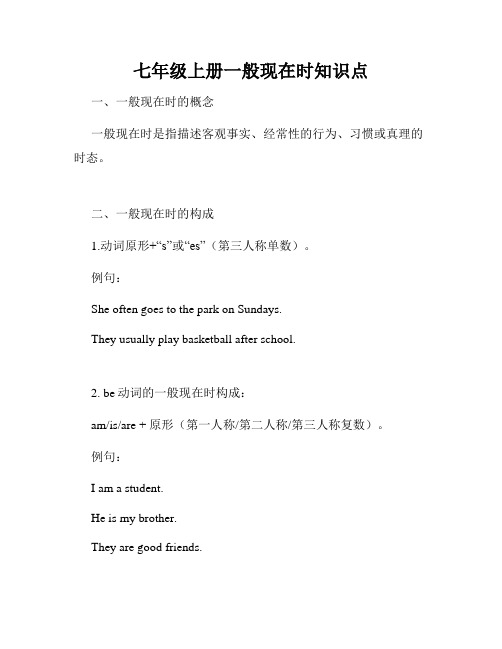
七年级上册一般现在时知识点一、一般现在时的概念一般现在时是指描述客观事实、经常性的行为、习惯或真理的时态。
二、一般现在时的构成1.动词原形+“s”或“es”(第三人称单数)。
例句:She often goes to the park on Sundays.They usually play basketball after school.2. be动词的一般现在时构成:am/is/are + 原形(第一人称/第二人称/第三人称复数)。
例句:I am a student.He is my brother.They are good friends.三、一般现在时的用法1.表示经常性的行为或习惯。
例句:I always get up at six in the morning.John never eats breakfast before he goes to school.2.表示客观事实、真理或普遍规律。
例句:The sun rises in the east and sets in the west. Water boils at 100 degrees Celsius.3.表示现在的状态或情况。
例句:She looks tired today.The weather is getting colder these days.4.表示说明原因、解释原因或评论事实。
例句:I study hard because I want to go to college.He is a good student, but he needs to improve his writing skills.四、注意事项1.动词要与主语保持一致。
例句:My sister likes playing tennis.(正确)My sister like playing tennis.(错误)2.第三人称单数动词要加“s”或“es”。
(七年级英语)一般现在时的讲解
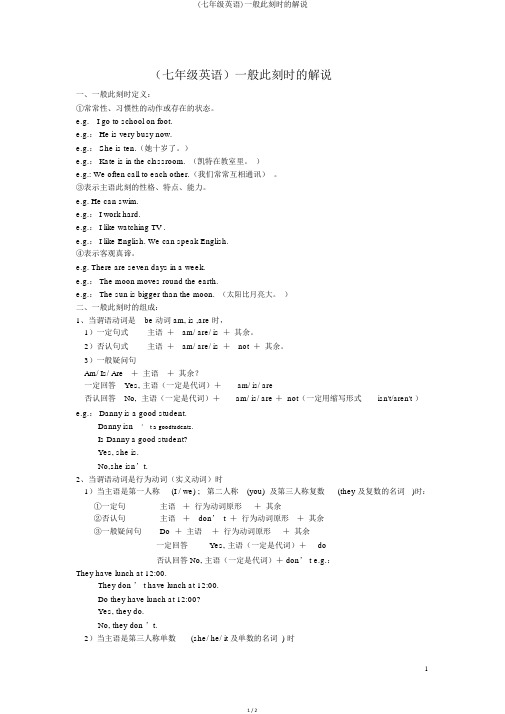
(七年级英语)一般此刻时的解说一、一般此刻时定义:①常常性、习惯性的动作或存在的状态。
e.g. I go to school on foot.e.g.: He is very busy now.e.g.: She is ten.(她十岁了。
)e.g.: Kate is in the classroom.(凯特在教室里。
)e.g.: We often call to each other.(我们常常互相通讯)。
③表示主语此刻的性格、特点、能力。
e.g. He can swim.e.g.: I work hard.e.g.: I like watching TV .e.g.: I like English. We can speak English.④表示客观真谛。
e.g. There are seven days in a week.e.g.: The moon moves round the earth.e.g.: The sun is bigger than the moon.(太阳比月亮大。
)二、一般此刻时的组成:1、当谓语动词是be 动词 am, is ,are 时,1)一定句式主语+am/ are/ is+其余。
2)否认句式主语+am/ are/ is+not+其余。
3)一般疑问句Am/ Is/ Are+主语+其余?一定回答Yes, 主语(一定是代词)+am/ is/ are否认回答No, 主语(一定是代词)+am/ is/ are + not(一定用缩写形式isn't/aren't )e.g.: Danny is a good student.Danny isn’ t a goodtudents.Is Danny a good student?Yes, she is.No,she isn’t.2、当谓语动词是行为动词(实义动词)时1)当主语是第一人称(I / we) ;第二人称(you) 及第三人称复数(they 及复数的名词)时:①一定句主语+行为动词原形+其余②否认句主语+don’ t+行为动词原形+其余③一般疑问句Do +主语+行为动词原形+其余一定回答Yes, 主语(一定是代词)+do否认回答 No, 主语(一定是代词)+ don’ t e.g.:They have lunch at 12:00.They don ’ t have lunch at 12:00.Do they have lunch at 12:00?Yes, they do.No, they don ’t.2)当主语是第三人称单数(she/ he/ it 及单数的名词 ) 时①一定句主语+行为动词的单三形式+其余②否认句主语+doesn’ t+行为动词原形+其余③一般疑问句Does +主语+行为动词原形+其余一定回答Yes, 主语(一定是代词)+does否认回答No, 主语(一定是代词)+doesn’ te.g.: Jenny speaks English very well.Jenny doesn’ t speak English very well.Does Jenny speak English very well?Yes, she does.No, she doesn’t.3.当谓语动词是神态动词+行为动词时:1)一定句主语+(神态动词+行为动词原形)+其余2)否认句主语+(神态动词+not+行为动词原形)+其余3)一般疑问句神态动词+主语+行为动词原形+其余?一定回答Yes, 主语(一定是代词)+神态动词否认回答No, 主语(一定是代词)+神态动词+not(一定是缩写形式 can’t, mustn’t, should n’t, needn’t等)e.g.: Tom can speak Chinese. 汤姆会说汉语。
七年级上学期-Unit2语法讲解

7A2:频率副词:always, usually, often, sometimes, seldom, never行前be后be+频率副词频率副词+行为动词一般现在时:●什么情况下用一般现在时?表示经常发生的动作或常态。
●结构:主+动原/v(s)+其他部分如:I often get up at 7:00 a.m./ She often gets up at 7:00 a.m.●怎么将陈述句变成否定句和一般疑问句呢?“无情无be要帮助”She is a girl.She isn’t a girl.Is she a girl?She can sing.She can’t sing.Can she sing?She gets up at 7:00 a.m.She doesn’t get up at 7:00 a.m.Does she get up at 7:00 a.m.?●动词怎样加s?一般情况直接加s. livelives; stopstops以ch, sh结尾的单词,加es. teachteaches; finishfinishes以辅音字母+y结尾的单词,改y为i再加es. crycries; studystudies特殊变化:dodoes; gogoes; havehas; saysays/sez/●时间标志词频率副词,everyday, every Monday, twice a year.注意点:there be句型的一般现在时(就近原则)There is a pen and two pencils here.There are two pencils and a pen here.。
七年级英语 Unit2 Daily life Grammar一般现在时
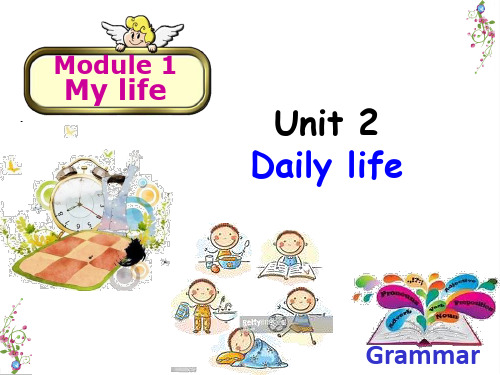
teach→teaches wash→washes
以字母o结尾的动词 加-es
go→goes
以辅音字母加y结尾的 carry→carries 动词, 先变y为i,再加-es worry→worries
特殊变化
have → has
一般疑问式
Am/Is/Are + 主语+其他Is …P? o is kind.?
或单数名词
否定句:
谓语动词:第三人称单数形式
助动词doesn’t + V原形
动词第三人称单数形式的变化:
构成方法
例词
在词尾加-s
help→helps know→knows get→gets read→reads
以字母s, x, sh, ch结尾 guess→guesses fix→fixes
的动词加-es
go to school by bus study Chinese, Maths and English in the morning take part in after-school activities
Do you go to school by bus?
Yes, I do.
Does Sam go to school by bus?
100%
always 总是
usually 通常
often 常常
sometimes 有时
seldom 很少
0%
never 从未
每天
在周六
一周两次
一月一次
次数的表达:
一次 once, 两次 twice,
三次及以上:
基数词 (three, four…)+times
Observe and work out the rule below.
七年级英语上册一般现在时
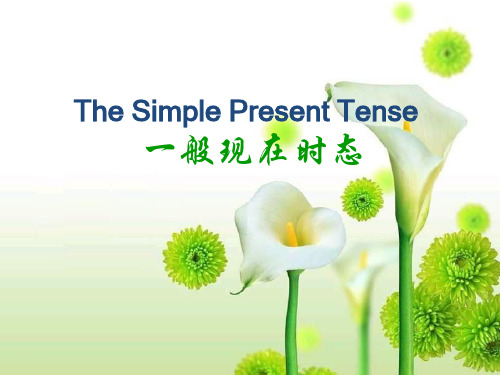
1.This is
my pencil ? (变一般疑
your pencil ?
问句)
2. These red socks are Kate’s . (变一般 疑问句) socks Kate’s ? 3. I want to buy a big green bag . (变特 殊疑问句) you want to buy ? 4. Mary does not have any books . (变肯 定句)Mary books .
31. That is an apple tree . (变为复数句)
32. Mike’s birthday is February 19th . (对画线 部分提问) is Mike’s birthday ?
33. Come down to our new shop, please. (变为否 定句)
1.be 动词的一般现在时的句式: 肯定句:主语+be+表语(n., adj.等)
e.g. He is a worker. You are thirteen. They are in the classroom.
否定句:主语+be+ not+表语
e.g. He is not a worker. You aren’t thirteen. They aren’t in the classroom. e.g. Is he a worker? Yes, he is./No, he isn’t. Are you thirteen? Are they in the classroom? Yes, they are. No, they aren’t.
(meet) you ! (ask) the policeman ?
七年级一般现在时
七年级一般现在时对于七年级的学生来说,一般现在时是英语语法学习中的一个重要时态。
它是我们描述日常生活、表达习惯、陈述普遍真理等常用的工具。
一般现在时的定义很简单,它用来表示经常发生的动作或存在的状态。
比如,“I go to school every day”(我每天上学。
)“She likes music”(她喜欢音乐。
)这两个句子中,“go”和“likes”所体现的动作就是经常发生的。
在构成上,一般现在时也有一定的规律。
当主语是第三人称单数(he、she、it 或者单个的人名等)时,动词要发生相应的变化,通常是在动词后面加“s”或者“es”。
例如,“He plays football very well”(他足球踢得很好。
)而当主语是非第三人称单数(I、you、we、they 或者复数名词等)时,动词就用原形。
像“We play games after class”(我们课后玩游戏。
)一般现在时的使用场景非常广泛。
它可以用来描述日常的习惯和行为。
比如说,“I always get up early in the morning”(我总是早上早起。
)“My father reads newspapers every evening”(我爸爸每天晚上看报纸。
)这能让别人清楚地了解到我们日常生活中的规律。
它还能用来陈述客观事实和普遍真理。
像“The earth moves aroundthe sun”(地球绕着太阳转。
)“Water boils at 100 degrees Celsius”(水在 100 摄氏度沸腾。
)这些都是不变的事实,所以用一般现在时来表达。
在否定句和疑问句的构成上,一般现在时也有自己的规则。
否定句中,如果主语是第三人称单数,需要在动词前加“doesn't”,动词变回原形;如果主语是非第三人称单数,就在动词前加“don't”。
比如,“He doesn't like sports”(他不喜欢运动。
七年级英语上册unit2知识点
七年级英语上册unit2知识点第一个知识点:动词的一般现在时态动词的一般现在时态用于表示现在经常重复或者普遍真理的状态或者行为。
它的构成方式是在动词原形的基础上加“s/es”或者不变形,具体规则根据动词的结尾而定。
例如:I always go to school by bus.He usually eats breakfast at 7am.They like playing soccer.第二个知识点:人称代词和物主代词人称代词用来代替特定的人或者物,分为主格和宾格两种形式。
主格通常在句子中做主语,宾格通常在句子中做宾语。
物主代词则表示所属关系,分为形容词性和名词性两种形式。
形容词性物主代词通常放在名词前面作定语,名词性物主代词则直接替代名词。
例如:She is my friend. (人称代词)I lost my book. (形容词性物主代词)This is hers. (名词性物主代词)第三个知识点:一些常见的时间单位在英语中,一些常见的时间单位有:second(秒),minute(分),hour(时),day(天),week (周),month(月),year(年)它们可以用来描述一段时间的长度或者某个具体的时间点。
例如:It took me five minutes to finish the task.I will have a week's vacation next month.My birthday is on October 13th.第四个知识点:形容词的比较级和最高级形容词的比较级和最高级用于表示两个或者多个事物在某个方面的程度高低或者优劣。
比较级的构成方式是在形容词原形后加“er”,最高级则在形容词原形后加“est”。
如果形容词以“e”结尾,只需要加“r/est”即可。
如果形容词以辅音字母+y结尾,只需要将“y”变成“i”,再加“er/est”。
如果形容词以一个元音字母和一个辅音字母结尾,则要在最后一个辅音字母前加“er/est”。
七年级上册 一般现在时态
一般现在时态Step1:定义与讲解一般现在时表示经常或习惯性的动作或一般性事实。
也可表示现在的状态或主语具备的性格和能力。
通常与副词every day(每天),always(总是),usually(通常),often(经常)sometimes(有时),等时间状语连用。
Step2:第三人称单数其他人称(一,二,三复)用动词原形。
第三人称单数:he she it 单数人名及物名e.g. I/ We like English very much.我/我们非常喜欢英语。
She/ He/His sister likes English very much. 她/他/她的妹妹非常喜欢英语★动词三单形式的变化规则:1.(1)多数直接在动词词尾加-s.play — plays like — likes ask---askswork---works get---gets call---calls(2)以字母s, x, ch, sh或o结尾的动词,在词尾直接加-es.watch---watches wash---washes do---does go---goes(3)以“辅音字母加- y”结尾的动词,要先变y为i再加-es.try---tries study---studies cry---cries fly---flies2.不规则变化:be---- is have----has练一练 (把下列动词变成第三人称单数形式)have like drink _____ go _____ stay ______ make______ look______ have_____ come______ watch______ ask _____ fly _______ do______ study_____ teach_______ sound______ let _______ wash _______ carry ______ play_______Step3:句型结构一般现在时态肯定句式:分为含有be动词和实义动词的两种情况:练一练(用Be动词填空。
广州版英语七年级上册 unit 2 Daily life 知识点巩固
Unit 2 Daily life 学案Part one 单词与短语Part two 课文内容精析1.brush one’s teeth刷牙; watch television= watch TV 看电视; play table tennis 打乒乓球;ride a bicycle 骑单车; play the piano 弹钢琴; wash my clothes洗衣服2.a day at school 学校的一天; by Sam: 由Sam写的at school 上学at the school在学校in hospital: 生病住院in the hospital: 在医院in bed: 卧病在床;躺在床上in the bed: 在床上(被窝里)3. I am a junior high school student. I love going to school.junior high school 初中senior high school 高中primary school 小学love doing sth.= like doing sth. = enjoy doing sth.喜欢做某事practice doing sth.练习做某事finish doing sth. 做完某事4. My school is close to my home, so I always go to school on foot.be close to 离……近= near =beside= not far away fromgo to school on foot= walk to school步行去学校go to…on foot = walk to …步行5. Classes start at 8 am, and I am seldom late.start at: 几点开始be late: 迟到be late for school 上学迟到6. I enjoy learning about different places in the world.enjoy doing sth= like/love doing sth. very much 喜欢做某事learn about:获悉;了解 different places in the world: 世界各地 different 反义词:the same7. We have our morning break at 9:50.have one’s morning break: 上午休息时间 take/have a break 课间休息 have a rest 休息一会8. When the bell rings, I run to the playground with my best friends Tom and Jack.When的两种用法 当……的时候 when he was reading,he fell asleep.对时间提问,“何时” When will they come back?9. Break ends at 10:10. How short it is !end 结束 = finish 无穷无尽:endless 反义词: start/ begin How short it is! “休息时间多么短啊!”结构为:How+形容词/副词+主语+谓语! 例如:How lovely the baby is ! 这孩子真可爱!(lovely 为形容词) How fast he runs! 他跑地多快啊!(fast 为副词) 【拓展】what 也可以引导感叹句,其构成为:(1)What + a / an + 形容词 + 可数名词单数 + 主语 + 谓语!例如:多么聪明的小男孩啊!What a clever boy he is !(2)What + 形容词 +不可数名词/可数名词复数 + 主语 + 谓语!例如:我们的主意真棒! What wonderful ideas (we have )!多冷的天! What cold weather it is !10. Lunch is from 11:50 to 12:30 p.m.from…to… 从……到…… from Monday to Friday11. Then Tom, Jack and I take part in the school band practice.band: 乐队 the school band practice: 学校乐队练习practice: 名词:练习 eg : Learning a language needs a lot of practice. 动词 practice doing sth. practice sth.eg : practice the violin practice playing the pianopractice 实习,实践,指有规律的练习,特指反复练习,不断练习,如大音乐家需要不断的practice。
- 1、下载文档前请自行甄别文档内容的完整性,平台不提供额外的编辑、内容补充、找答案等附加服务。
- 2、"仅部分预览"的文档,不可在线预览部分如存在完整性等问题,可反馈申请退款(可完整预览的文档不适用该条件!)。
- 3、如文档侵犯您的权益,请联系客服反馈,我们会尽快为您处理(人工客服工作时间:9:00-18:30)。
初一英语专题学案:一般现在时七年级上册U2同步Warm-up: ReadingI am a junior high school student. I love going to school. My school is close to my home, so I always go to school on foot. My favourite subject is Geography. I enjoy learning about different places in the world. In the morning, we usually study Chinese, maths and English. I often play games with my best friends Tom and Jack. Break ends at 10:10 a.m. How short it is! Then Tom, Jack and I take part in the school band practice. We make great music together. I always have a good time at school.一、重难点1)一般现在时的用法2) 一般现在时的构成3) 一般现在时的时间状语【频度副词】4)一般现在时的各种句子类型二、精讲点拨(一)何时用到一般现在时表示现在的状态和主语的特征。
常见的表示状态的动词有:be, have, love, like, know, see, hear等。
The teacher likes collecting coins.表示经常发生或习惯性的动作,常与频度副词连用。
I go to school at 7 every morning.表示客观事实和普遍真理,以及谚语、格言等。
The moon moves round the earth.(二)一般现在时的构成主语+ be(am/is/are) + 其它主语+ 动词原形+ 其它主语(第三人称单数) + 动词三单式+ 其它【扫清障碍】动词三单式(三)一般现在时的变化主语+ be(am, is, are) + 其它(肯定句):I am from Shenzhen. (Beijing)(否定句):I am not from Shenzhen.(一般疑问句):Are you from Shenzhen?(肯定回答):Yes, I am.(否定回答):No, I’m not.(对划线部分提问):Where are you from?(改为选择疑问句):Are you from Shenzhen or Beijing?主语+ 动词原形+ 其它(肯定句):The pupils read English every day. (Chinese)(否定句):The pupils don’t read English every day.(一般疑问句):Do the pupils read English every day?(肯定回答):Yes, they do.(否定回答):No, they don’t(对划线部分提问):What do the pupils read every day?(改为选择疑问句):Do the pupils read English or Chinese every day?主语(第三人称单数) + 动词三单式+ 其它(肯定句):He plays the piano in the evening. (violin)(否定句):He doesn’t play the piano in the evening.(一般疑问句):Does he play the piano in the evening?(肯定回答):Yes, he does.(否定回答):No, he doesn’t(对划线部分提问):When does he play the piano in the evening?(改为选择疑问句):Does he play the piano or violin in the evening?二、频度副词&短语(一)频度副词(Adverbs of Frequency)十全十美一直/总是通常经常有时很少从不【小试牛刀】按照以上图片写出句子1.2.3.4.5.6.【深入进阶】频度副词在句中的位置He is never late for school.(二)表示频度的副词短语(Adverbial Phrases of Frequency)on on Sundays On Mondays, we usually have eight lessons.every morning I go to school every morning.every every Sunday morning Every Sunday morning, I study English in Beststudy. every two days My grandpa takes exercise every two days.every other day He has noodles for breakfast every other day.once a week He visits his grandfather once a week.次数twice a month She swims twice a month.four times a year Four times a year, they go on holidays.【深入进阶】表示频度的副词短语在句中的位置小试牛刀:1.My mother _______ (work) in a primary school and I ________ (study) in the same school. 2.I ________ (have) a bike and Ben _________ ( have ) a bike, too.3.My sister _________ ( be ) a pupil. She _______ (study) very hard.4.Who _______ (cook) breakfast for your family?5.My father is a teacher. He _________ (teach) Chinese in a primary school.6.He _________(be) strong. He can _________ (carry) the heavy box.7.John ________(go) to school by bike every day.8.Kate often __________(play) table tennis with her friends after school last year.9.My mother often ________(go) shopping and ________(buy) some vegetables in the market. 10.---Who ________ (study) hard in your class?---Mary ________(do).频度副词:always>usually>often>sometimes>seldom>never1.Ann is a good student. She’s ______ happy to help others.A. sometimesB. seldomC. neverD. always2. He’ s good at maths. He ______ makes mistakes in his maths homework.A. alwaysB. usuallyC. seldomD. often3. It often rains in summer in my hometown. But it _______ rains heavily.A. alwaysB. sometimesC. neverD. seldom4. We visit the museum twice a year. ( 对画线部分提问)________ ________ do you visit the museunm?三、巩固提升1) 写出以下动词主语为第三人称单数时的一般现在时的正确形式。
1.be_______2. have_______3. try_______4. do_________5. judge_________6. catch_________7. worry________8. lay___________ 9. finish__________ 10. dance________2) 语法练习:1.She never______ her problems with her parents.A. discussB. discussesC. is discussingD. are discussing2.After school she often _______ the violin.A. playB. playsC. plaiesD. playes3.Cheng Na usually _______ her homework an hour before dinner.A. finishB. to finishC. finishesD. finishing4.She _____ breakfast at school.A. haven’tB. hasn’tC. doesn’t haveD. doesn’t has5.___ Mary _____ her hair every day?A. Do, washB. Do. washesC. Does, washD. Is, washing6. My father is very busy. He often ______ home late.A. is comingB. is comeC. comesD. come7.Did the teacher ____ you why the earth _____ around the sun?A. tell, goB. tells, goC. tells, goesD. tell, goes8.______ your grandparents ______ with you?A. Does, liveB. Do, liveC. Do, livesD. Does, lives3)用括号中的单词的正确形式填空。
